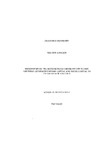JavaScript is disabled for your browser. Some features of this site may not work without it.
| dc.contributor.advisor | Vinnicombe, Susan | |
| dc.contributor.advisor | Svejenova, Silviya | |
| dc.contributor.author | Terjesen, Siri | |
| dc.date.accessioned | 2009-11-20T16:05:40Z | |
| dc.date.available | 2009-11-20T16:05:40Z | |
| dc.date.issued | 2005-08 | |
| dc.identifier.uri | http://hdl.handle.net/1826/3986 | |
| dc.description.abstract | This thesis explores the phenomenon of individuals leaving management careers in large corporations and establishing their own new ventures. Although the "corporate leaver" entrepreneur story enjoys frequent coverage in the popular press, there is little extant academic research on these individuals and their entrepreneurial process. Particularly lacking is an understanding of how the entrepreneurs make use of their past experiences. This study explores how entrepreneurs leverage human capital and social capital from previous work experiences when starting their own ventures. This dissertation is based on the results of an exploratory study and a main study, both of which were classified using Nvivo software. The exploratory study consists of interviews with six male/female entrepreneur pairs matched by management level and industry sector of previous employment. The exploratory study identifies the entrepreneurs' human capital and bridging and bonding social capital as well as feelings about previous work experience, motivations to start a new venture and family commitments. The main study is based on interviews with 24 entrepreneurs (twelve male, twelve female) who recently left management positions in financial services firms to establish their own businesses. The main study extends the exploratory study by unpacking the transfer of human capital in the form of knowledge creation and the transfer of bonding and bridging social capital. The research offers a number of theoretical, empirical, methodological and practical contributions to the field. At a theoretical level, this research confirms the usefulness of human capital and social capital for examining entrepreneurs' transfer from corporate. An analysis of the main study interviews reveals that the transfer of tacit and explicit knowledge from past work experience to the new venture can be mapped to Nonaka's knowledge creation framework. Third, the research highlights the application of structural, relational and cognitive dimensions of social capital to the former corporate entrepreneurs' social networks. A typology of the degree of transferability of human capital and social capital from previous work experiences is suggested, and eight case studies illustrate the four types: applicators, exploiters, networkers and re-inventors. The thesis offers empirical evidence in the form of entrepreneurs' self-reported human capital and social capital. Entrepreneurs' human capital is classified in terms of education, family background, and industry, management, business development and start-up experience. Entrepreneurs' social capital is organised by bonding (e. g. partners, mentors) and bridging relationships. The results indicate some differences between male and female entrepreneurs in terms of gender homophily of social networks. A framework for analysing the transfer of human capital and social capital from past experience is developed. There is empirical evidence both of knowledge and networks which the entrepreneurs report as transferring to the new venture, and those which do not. Entrepreneurs' creation of new knowledge from past work experience and transfer to the new venture can be classified by Nonaka's socialisation, externalisation, combination and internalisation types. In terms of social capital, entrepreneurs report transferring relationships from past work experiences which have structural, relational and cognitive embeddedness. At the methodological level, the rich, qualitative nature of this research enables new insights into the transition from corporate to own ventures. Entrepreneurs' language is used to measure relational, structural and cognitive embeddedness. The thesis offers knowledge of practice. The phenomenon of individuals leaving corporate management careers to start own ventures, particularly in the financial services industry, is examined and explored. Implications for managers interested in leaving corporate to start their own ventures are offered, as are suggestions for corporations interested in retaining these employees. A typology of former corporate entrepreneurs by human capital and social capital transfer is developed. Authenticity- seeking motives are uncovered in the rhetoric of individuals who start new ventures in new industries. | en_UK |
| dc.language.iso | en | en_UK |
| dc.publisher | Cranfield University | en_UK |
| dc.rights | © Cranfield University, 2005. All rights reserved. No part of this publication may be reproduced without the written permission of the copyright holder. | en_UK |
| dc.title | Entrepreneurs' transitions from corporate life to own ventures - leveraging human capital and social capital to establish new businesses | en_UK |
| dc.type | Thesis or dissertation | en_UK |
| dc.type.qualificationlevel | Doctoral | en_UK |
| dc.type.qualificationname | PhD | en_UK |
